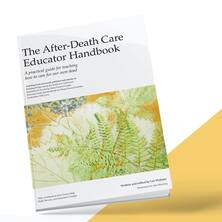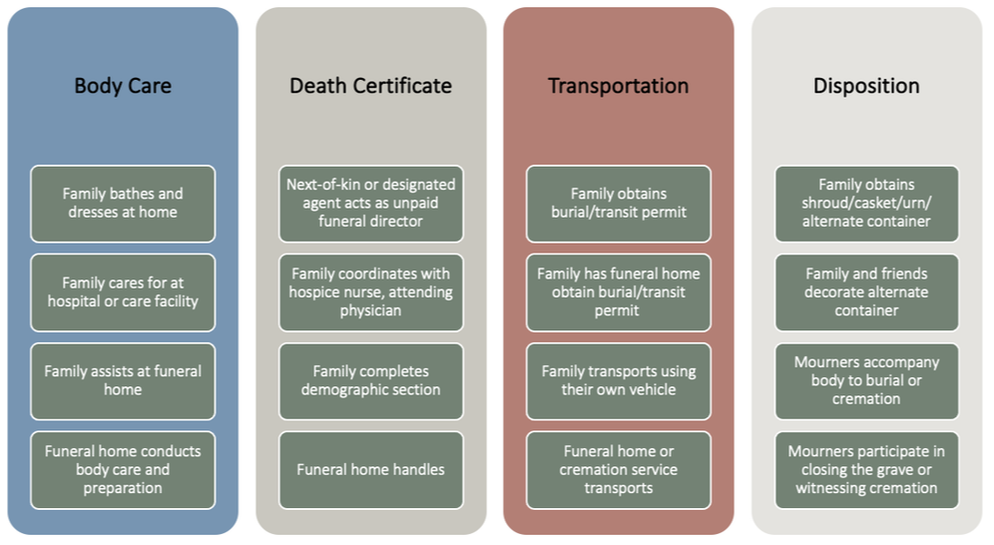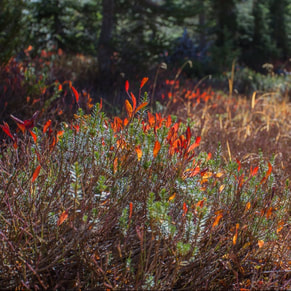A Continuum of Care
Historically, care for the dead was handled by family and community. For some families, religious and cultural rituals continue to provide guidance, support, and meaning when death occurs. We honor and respect the Black funeral tradition of homegoings, religious burial societies such as Jewish chevra kadisha, Muslim janazah, and Quaker Care Groups, tribal practices of Native American communities, and the death care and bereavement traditions sustained in immigrant and refugee communities. For communities subjected to systemic racism, caring properly for the dead is a deeply important form of community respect and cultural survival. (See our Resources section for more on the impact of systemic racism in death care.)
|
On This Page
|
For many in North America, the ways our ancestors cared for each other in death have been forgotten, with death care outsourced to paid funeral professionals. The movement to relearn and reclaim family-led and community-supported death care practices within the larger culture has described this approach as a home funeral.
Information on these How To pages will assist families and community members in Washington with handling some or all of these functions associated with caring for the dead, including Perform Body Care, Complete Paperwork, Arrange Disposition, Transport the Dead, Create Ceremony, Go Out Greener. If you choose to hire professionals to handle or assist with any of these functions, read Work with Professionals for tips on getting what you want and need, no more or less.
What is a home funeral?

What’s referred to as a “home funeral” is:
Excerpt from Undertaken With Love: A Home Funeral Guide for Congregations and Families by Holly Stevens and Donna Belk included in the newly republished After-Death Care Educator Handbook available through Amazon.
For a range of examples, see our Stories section.
- a noncommercial, family-centered response to death that
- involves the family and its social community in the care and preparation of the body for burial or cremation
- and/or in planning and carrying out related rituals or ceremonies
- and/or in the burial or cremation itself
- May occur entirely within the family home or not
- Differentiated from the institutional funeral by
- emphasis on minimal, noninvasive care and preparation of the body
- reliance on the family’s own social networks for assistance and support
- relative or total absence of commercial funeral providers in its proceedings.
Excerpt from Undertaken With Love: A Home Funeral Guide for Congregations and Families by Holly Stevens and Donna Belk included in the newly republished After-Death Care Educator Handbook available through Amazon.
For a range of examples, see our Stories section.
4 Funeral Essentials
At each step of the process there is a continuum of options. Tasks can be left entirely to a paid professional or can be handled by family or designated unpaid support people, friends, and community members. (The term “family” in the chart below refers inclusively to all of these relationships.)
Blended Funerals
Having a home funeral does not mean you have to do everything. Blended funerals, where a professional is hired for certain aspects such as filing paperwork or transportation, may provide the peace of mind needed while coordinating other aspects of gathering family and friends around the deceased or arranging for final disposition and memorialization.
Having a home funeral does not mean you have to do everything. Blended funerals, where a professional is hired for certain aspects such as filing paperwork or transportation, may provide the peace of mind needed while coordinating other aspects of gathering family and friends around the deceased or arranging for final disposition and memorialization.
Building Your Team
Taking on aspects of family- or community-led death care will require coordination with authorities and likely involvement of others. Here are some tips on preparing ahead. (See also How to Work With Professionals.)
Doctors
If the primary care or hospice physician and staff know that the the deceased will be kept at home prior to disposition of the body, or that the family or designated agent plans to file a paper death certificate (instead of using a funeral home to do so electronically), they may be willing to help by filling out the medical portion of the death certificate in a more timely manner. Anticipated deaths that occur at home but not on hospice service must have a physician of record involved to avoid being considered an unattended death; see "Completing the Death Certificate" in How to Complete Paperwork for details.
Hospice
If hospice is involved, be sure to let them know well before the death occurs that you are planning to keep the deceased at home (or bring them to a home or community location from a facility) so they can help make the aftercare smooth for all. They may be unaware that there is no legal time limit in Washington for how long the dead may be kept at home before final disposition.
Religious Leaders/ Clergy
If the dying person is part of a spiritual community, that leader can be an invaluable contributor to the experience. You may ask them to attend at any point in the dying process, or to officiate in public or private ceremonies. Some may have little or no experience with families and communities planning a more engaged role in death care with reduced or no role for a funeral home, so advance discussion is advised.
Other Family Members & Non-Family Support People
Home death care is a group effort. By informing your family, friends, and other non-family support people about this decision, each person will have time to feel out their own comfort level and develop ways to participate. For those without existing family or community support, a Community Care Group may be able to assist (see below).
Home Funeral Guides
Home funeral guides are well versed in ways to assist those seeking to conduct funeral care in home or community settings. To learn more about home funeral guides, go to the National Home Funeral Alliance
or the After-Death Care page of National End-of-Life Doula Alliance.
End-of-Life Doulas
End-of-life doulas (EOLDs) seek to make the act of living out final days in familiar, loving surroundings more feasible for the dying and their caregivers, whether or not they engage hospice services. To locate an end-of-life doula near you, go to the National End-of-Life Doula Alliance directories or consult the local Washington organizations listed in our Resources.
Funeral Directors
If you choose to have any services performed by a funeral home, you are advised to discuss their part ahead of time. You can call for prices or pick up a copy of their “General Price List,” which they must furnish on request, as required by law. Funeral homes that are supportive of family and community involvement may allow use of their facilities (for a fee) to bathe and dress the body.
County Registrar
It’s advisable to check in beforehand with the County Registrar in the county where it is anticipated the death will occur to ensure their cooperation with filing the Death Certificate and obtaining the Burial-Transit permit.
(For more information, go to How to Work With Professionals.)
Doctors
If the primary care or hospice physician and staff know that the the deceased will be kept at home prior to disposition of the body, or that the family or designated agent plans to file a paper death certificate (instead of using a funeral home to do so electronically), they may be willing to help by filling out the medical portion of the death certificate in a more timely manner. Anticipated deaths that occur at home but not on hospice service must have a physician of record involved to avoid being considered an unattended death; see "Completing the Death Certificate" in How to Complete Paperwork for details.
Hospice
If hospice is involved, be sure to let them know well before the death occurs that you are planning to keep the deceased at home (or bring them to a home or community location from a facility) so they can help make the aftercare smooth for all. They may be unaware that there is no legal time limit in Washington for how long the dead may be kept at home before final disposition.
Religious Leaders/ Clergy
If the dying person is part of a spiritual community, that leader can be an invaluable contributor to the experience. You may ask them to attend at any point in the dying process, or to officiate in public or private ceremonies. Some may have little or no experience with families and communities planning a more engaged role in death care with reduced or no role for a funeral home, so advance discussion is advised.
Other Family Members & Non-Family Support People
Home death care is a group effort. By informing your family, friends, and other non-family support people about this decision, each person will have time to feel out their own comfort level and develop ways to participate. For those without existing family or community support, a Community Care Group may be able to assist (see below).
Home Funeral Guides
Home funeral guides are well versed in ways to assist those seeking to conduct funeral care in home or community settings. To learn more about home funeral guides, go to the National Home Funeral Alliance
or the After-Death Care page of National End-of-Life Doula Alliance.
End-of-Life Doulas
End-of-life doulas (EOLDs) seek to make the act of living out final days in familiar, loving surroundings more feasible for the dying and their caregivers, whether or not they engage hospice services. To locate an end-of-life doula near you, go to the National End-of-Life Doula Alliance directories or consult the local Washington organizations listed in our Resources.
Funeral Directors
If you choose to have any services performed by a funeral home, you are advised to discuss their part ahead of time. You can call for prices or pick up a copy of their “General Price List,” which they must furnish on request, as required by law. Funeral homes that are supportive of family and community involvement may allow use of their facilities (for a fee) to bathe and dress the body.
County Registrar
It’s advisable to check in beforehand with the County Registrar in the county where it is anticipated the death will occur to ensure their cooperation with filing the Death Certificate and obtaining the Burial-Transit permit.
(For more information, go to How to Work With Professionals.)
Doing it Your Way: Home Funerals on the Rise
The home funeral movement is gaining momentum throughout the country and the world, validating the needs of families, non-biological kinship circles, and communities to honor their own in ways that are affordable, values-based, and environmentally responsible. The high cost of conventional funerals is only one reason to consider alternatives. Additionally, studies show that families and friends, children especially, accept death more readily when they participate in the process of saying goodbye after a death in the home at their own pace. Family- and community-led funerals require shouldering of responsibilities and grief.
Home funerals are about empowering families and communities to care for their own dead, to take the time to be present and absorb the change, to complete a process that is intimate and meaningful without outsourcing it or parts of it unless desired, to build community around and in the wake of the death of a member. It’s about authenticity and responsibility and constitutional family rights and strengthening and defining familial and community culture.
To learn more about Washington organizations aligned with these values, see the local listings on our Resources page. To connect with others around the U.S. and the world who advocate for home funerals, go to the National Home Funeral Alliance, the National End-of-Life Doula Alliance, the Conservation Burial Alliance, the Green Burial Council, and the Funeral Consumers Alliance. To learn about the impact of systemic racism on death care for people of color, read How do you foster a good death in a racist society?, watch Why Are Black & White Funeral Homes STILL Separate?, and listen to Dr. Kami Fletcher discuss How historic and present-day death rituals and funeral practices in the Black community serve as acts of resistance (podcast episode 156); see our Resources section for more.
Home funerals are about empowering families and communities to care for their own dead, to take the time to be present and absorb the change, to complete a process that is intimate and meaningful without outsourcing it or parts of it unless desired, to build community around and in the wake of the death of a member. It’s about authenticity and responsibility and constitutional family rights and strengthening and defining familial and community culture.
To learn more about Washington organizations aligned with these values, see the local listings on our Resources page. To connect with others around the U.S. and the world who advocate for home funerals, go to the National Home Funeral Alliance, the National End-of-Life Doula Alliance, the Conservation Burial Alliance, the Green Burial Council, and the Funeral Consumers Alliance. To learn about the impact of systemic racism on death care for people of color, read How do you foster a good death in a racist society?, watch Why Are Black & White Funeral Homes STILL Separate?, and listen to Dr. Kami Fletcher discuss How historic and present-day death rituals and funeral practices in the Black community serve as acts of resistance (podcast episode 156); see our Resources section for more.
Community Care Groups
In some communities, helping each other to care for the dead is a matter of longstanding tradition, religious practice, or cultural survival, either through organized networks or reliance on community healers and helpers. With the rise in interest in relearning these practices within the larger culture, some are forming community care groups to assist with aspects of home funerals as needed. Some examples of community care groups are:
To connect with Washington-based community care resources, check with the local organizations listed on our Resources page along with A Place to Die and BLM Sea-King.
For one example of a community care group, see Lashanna’s Story. For more information on starting a community care group, read Undertaken With Love: A Home Funeral Guide for Congregations and Families by Holly Stevens and Donna Belk, included in the newly republished After-Death Care Educator Handbook available through Amazon.
- Threshold Care Circles — trained volunteers offering support and education to their wider community
- Faith Community Care Groups — members of spiritual communities, church committees, or other faith-based groups who are prepared to aid individuals and families within their own spiritual community
- Religious Burial Societies — Jewish chevra kadisha, Muslim janazah, Quaker Care Groups, and many Christian denominations prepare the bodies of members in separate sex groups within their faith communities
- Hospice Care Groups — hospice personnel who form a group that volunteers to assist after a family member has been on hospice service
- Independent Care Groups — groups of individuals who sometimes pledge to help each other care for each other or their loved ones’ remains.
To connect with Washington-based community care resources, check with the local organizations listed on our Resources page along with A Place to Die and BLM Sea-King.
For one example of a community care group, see Lashanna’s Story. For more information on starting a community care group, read Undertaken With Love: A Home Funeral Guide for Congregations and Families by Holly Stevens and Donna Belk, included in the newly republished After-Death Care Educator Handbook available through Amazon.
Resources and Online Links
Learn How To: |
Learn About: |
Washington Funeral Resources
and Education [email protected] Contact Landscape photos courtesy of Sean Proll Justin Craig All Rights Reserved |
Washington Funeral Resources and Education is a non-commercial public interest site dedicated to helping Washington consumers care for their own dead with or without the assistance of a funeral director. See FuneralPartnership.org for more state funeral information. This site is maintained as a project of White Eagle Memorial Preserve and Sacred Earth Foundation, which coordinates responses to inquiries with other Washington-based organizations and practitioners that support the mission of the Funeral Partnership.
Disclaimer:
This website has been created by volunteers making reasonable efforts to provide resources and materials for informational purposes only. Any information you obtain from this website is not legal advice and should not be relied upon without confirmation of current law. No warranties, expressed or implied, are made with respect to the information herein. There is no guarantee that the information contained here is complete or up-to-date as of the date that you view this site. The agencies linked via hyperlinks are responsible for the content of those sites. Their information is subject to change and should be consulted directly to ensure accurate and up-to-date information. Please report any inaccuracies to us in the form on the CONTACT page. Thank you!
This website has been created by volunteers making reasonable efforts to provide resources and materials for informational purposes only. Any information you obtain from this website is not legal advice and should not be relied upon without confirmation of current law. No warranties, expressed or implied, are made with respect to the information herein. There is no guarantee that the information contained here is complete or up-to-date as of the date that you view this site. The agencies linked via hyperlinks are responsible for the content of those sites. Their information is subject to change and should be consulted directly to ensure accurate and up-to-date information. Please report any inaccuracies to us in the form on the CONTACT page. Thank you!


